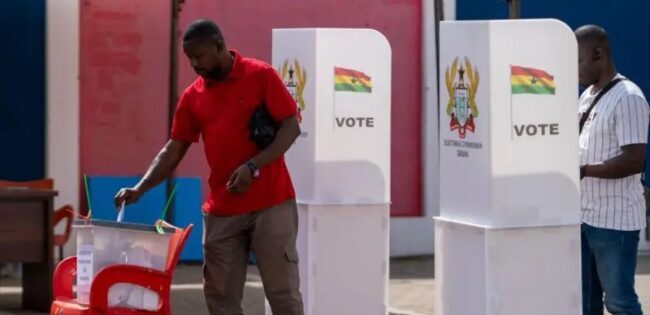Reach the right people at the right time with Nationnewslead. Try and advertise any kind of your business to users online today. Kindly contact us for your advert or publication @ Nationnewslead@gmail.com Call or Whatsapp: 08168544205, 07055577376, 09122592273

Ghana will make another historic decision as over 18.7 million registered voters prepare to elect a new president.
With President Nana Akufo-Addo’s tenure nearing its end, the 2024 presidential election has become a focal point of national and regional attention.

Among the 12 candidates vying for the presidency, Vice President Mahamudu Bawumia and former President John Mahama stand out as the frontrunners in what many analysts describe as a high-stakes contest.
Tribune Online presents 10 points you should take note of as we await the new leader of the nation:
- Ghanaians Will Decide a New President on Saturday, December 7th
The election marks the end of President Nana Akufo-Addo’s tenure, which concludes in January. Over 18.7 million Ghanaians are registered to vote, with polling stations set up across the country’s 16 regions and 276 constituencies. According to the constitution, a candidate must secure more than 50% of the valid votes to win outright; otherwise, a runoff will be held within 21 days.
- The Election Features 12 Candidates
Twelve candidates are running for president, including four independents. The race also includes one female candidate after Akua Donkor, another female aspirant, passed away recently. While the full list of candidates is diverse, political observers see the election as a likely contest between two familiar rivals.
- A High-Stakes Contest Between Bawumia and Mahama
Vice President Mahamudu Bawumia of the New Patriotic Party (NPP) and former President John Mahama of the National Democratic Congress (NDC) are the leading contenders. The two have faced each other in previous elections. Mr. Bawumia is the first Muslim and non-Akan to lead a major political party since Ghana’s Fourth Republic began in 1992.
- Historical First: Two Northern Candidates
For the first time, both major parties are presenting candidates from northern Ghana. Bawumia comes from the North East Region, while Mahama hails from the Savannah Region. The northern regions have traditionally favoured the NDC, but Bawumia’s candidacy may alter this dynamic.
- Dark Horses May Influence the Outcome
Analysts are closely watching independent candidates Nana Bediako (Cheddar) and Alan Kyerematen. Bediako, a wealthy property developer, has focused on mobilising young voters, drawing comparisons to Nigeria’s Peter Obi, who gained significant youth support in his country’s 2023 election. Meanwhile, Kyerematen, who broke away from the NPP after losing its primary, has reportedly gained support from some NPP members.
- Youth Hold the Key to the Election
With 10.3 million voters aged 18–35, young people make up the majority of Ghana’s electorate. First-time voters, numbering over 708,000, are also expected to play a critical role in shaping the election outcome.
- Economy Takes Center Stage in Campaigns
The economy has been the most discussed issue during the campaign. Mahama has accused the NPP government of economic mismanagement, pointing to debt restructuring, currency devaluation, and borrowing. “We have borrowed to the extent of not being able to pay our creditors,” he said during a recent campaign stop. The NPP, however, has highlighted achievements such as free secondary education and digital reforms, while dismissing Mahama’s criticisms. “Is the exchange rate the only determinant of the economy?” Peter Mac Manu, the NPP campaign manager, questioned.
- LGBTQ+ Debate Adds to Campaign Tensions
The LGBTQ+ issue has emerged as a contentious topic in the campaigns, with candidates addressing it differently to appeal to voters. While the economy has dominated discussions, social and cultural issues have also shaped the narrative.
- The Eight-Year Rule Could Be Tested
Ghana’s Fourth Republic has seen a pattern where no political party has won three consecutive presidential elections. The NPP is attempting to break this trend, while the NDC is banking on it to regain power after eight years in opposition.
- Greater Accra and Swing Regions Hold the Key
Regional dynamics are expected to play a significant role. Greater Accra, with 3.7 million voters, is a key swing region. The Ashanti Region, an NPP stronghold with 3.2 million voters, and the Volta Region, an NDC base, will also be critical. As legal expert Bernice Sam observed, “The outcome of this race will depend significantly on voter turnout, economic sentiment, and how well each candidate addresses the electorate’s concerns about governance and development.”
ALSO READ FROM NIGERIAN TRIBUNE
Reach the right people at the right time with Nationnewslead. Try and advertise any kind of your business to users online today. Kindly contact us for your advert or publication @ Nationnewslead@gmail.com Call or Whatsapp: 08168544205, 07055577376, 09122592273







